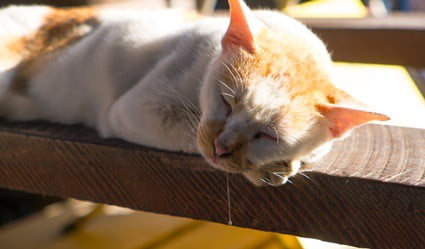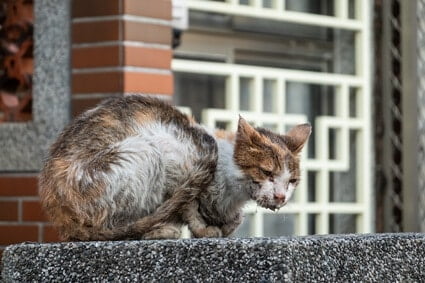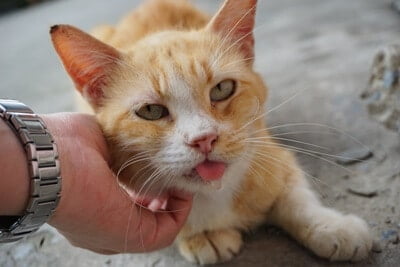Drooling often goes unnoticed until the owner finds a tiny damp spot where the cat was lying down. Some cats are “happy droolers,” so they drool when they feel very relaxed. However, if your cat begins drooling suddenly with no history or hypersalivation, it may be a cause for concern.
Cats may drool due to pain caused by broken teeth, dental disease, or exposure to toxic chemicals. The reasons for drooling are grouped into emotional stimuli, health conditions, and physical irritants. The most common cause of hypersalivation in cats is dental disease, which occurs in 85% of cats over the age of 3.
Cats usually drool intermittently and in small amounts. However, if you notice your cat drooling too much or other symptoms, such as lethargy, accompany drooling, then your cat should be seen by a vet.
When is Drooling Normal in Cats?
A cat’s mouth is continuously producing saliva to moisten food and prevent dryness of the mouth. Saliva also consists of antibacterial agents that help with wound healing and keeping your cat clean. Even healthy older cats may drool, and some kittens may dribble.
A small but significant number of cats also drool in response to positive stimulation. This is accompanied by purring, rubbing the head against you or nearby objects, or rolling over to expose the belly submissively.
In other words, some cats drool when they are feeling very comfortable. During brushing, massaging, or petting, your cat’s muscles relax, allowing its mouth to open and some of its saliva to drip down.
It’s also normal for cats to drool when they are feeling nervous. Some cats may drool when they enter the vet’s office, while others may hypersalivate when they’re apprehensive during a car ride. Drooling in these conditions is often temporary.

Causes of Drooling in Cats
Seeing saliva dripping from a cat’s mouth is unnatural as cats do not salivate when they’re offered something tasty. Since drooling is rarely normal in cats, it can indicate a severe medical issue. If you notice your cat drooling suddenly, here are some of the causes:
Oral Problems
Dental disease is regularly an explanation. In such cases, cats drool to soothe the irritation in their mouths or throats.
If swallowing hurts, your cat may leak saliva out of its mouth. Your cat may avoid eating food due to pain during swallowing or eating. Common causes of mouth pain in cats include:
- Dental disease (gingivitis)
- Tumors or ulcers in the mouth
- Broken tooth
- A foreign body under the tongue
- Exposure to toxic chemicals
- Recent interactions with a toxic plant
- Injury. For example, if your cat chews on an electric cord and gets an electric shock
Drooling may be accompanied by other symptoms such as:
- Halitosis (bad breath)
- Weight loss
- Loss of appetite
- Lack of interest in hard food
- Dropping food while eating
According to the Canadian Veterinary Medical Association, feline resorptive lesions (FORL), cervical line erosions, internal or external root resorptions, and neck lesions commonly result in dental disease in cats that can cause significant drooling and oral pain.
FORL occurs in over 50% of adult cats where their teeth become functionally impaired due to dental resorptions. The lesions can occur very close to the region where the tooth meets the gum line.
FORL is often seen as a red line along your cat’s gums. Sometimes, if a cat has excessive tartar on its tooth, the gum lesion may not be as apparent.
FORL is a painful gum disease in cats that can cause mouth sensitivity, foul mouth odor, fractures of the teeth, drooling, and inappetence. If left untreated, it can lead to chronic pain and subsequent weight loss in cats.
Respiratory Conditions
Viral respiratory conditions can result in ulcerations inside a cat’s mouth. This can cause mouth pain and an increased flow of saliva. Cats that live in shelters or multi-cat homes have a higher risk of respiratory infections.
A vet must treat infections. However, you can take steps to prevent your cat from getting infected. Some of these include keeping your cat indoors, ensuring up to date on vaccinations, limiting interactions with other pets, and washing your hands after handling other animals.
Kidney Failure
Kidney failure can be seen in acute or chronic conditions. Cats with chronic renal failure (CRF), also called chronic kidney injury, often show clinical signs of increased thirst, weight loss, dilute urine, increased urination (seen as larger clumps in the litter box), foul mouth odor, and excessive drooling.
This condition occurs when the kidneys can’t filter waste products, creatine, and BUN, out of the body. As these waste products accumulate in the bloodstream, they create uremic ulcers in the stomach, mouth, and esophagus. A vet often treats kidney disease with:
- Medication
- IV fluids
- Blood work monitoring
- Stomach protectants
- A low protein diet
Swallowing a Foreign Object
If your cat has ingested something that tastes foul or toxic, one of its initial reactions may be drooling. Sometimes ingesting a toxin can also cause oral erosions, which can also result in drooling.
Swallowing a thread with a needle attached or a foreign body that can get caught in the tongue, the back of the throat, or the soft or hard palate can result in oral pain and drooling.
Your cat may also find it hard to close its mouth. If a foreign body, such as a fishbone, is lodged in the esophagus, saliva has no place to go. It will start pooling in your cat’s esophagus and spill out of its mouth.
If you notice a string hanging out of your cat’s mouth, avoid trying to pull it out. The string can wrap around vital organs, such as the stomach or intestines. Pulling on it can result in significant, irreversible damage.
If swallowing is uncomfortable, your cat may paw at its mouth and try to vomit. The inability to swallow properly may cause a lack of appetite and unexplained weight loss in cats.
Cat Salivating After Medicine
Medication can also cause your cat to hypersalivate. One cat’s reaction to its medicine may be entirely different from another’s, and while one cat may not have any reaction, another may begin drooling.
In most cases, bitter medicines can cause your cat to drool. If you’re administering a specific medication for the first time, find out about possible side effects, such as drooling, and what you should do about it.
Corrosive Poisons
Cats can’t metabolize chemicals and medicines well. This is due to their altered liver metabolism, called glucuronidation.
Corrosion from chemicals (laundry detergents, liquid potpourri, floor cleaners, weed killer, etc.) can result in burns to the mouth, tongue, esophagus, and stomach. If ingested, they may result in poisoning and severe drooling.
If you suspect that your cat was recently exposed to a corrosive chemical, you should flush out its mouth with water. After flushing, offer your cat something it will enjoy drinking, such as chicken broth. This will flush out the esophagus and weaken the toxin inside the mouth.
Poisonous Plants
According to Mark S. Thompson, plants containing insoluble calcium oxalate crystals can lead to intense burning of the mouth if your cat accidentally ingests one. Plants that are poisonous to cats include:
- Peace lily
- Calla lily
- Elephant ear plant
- Dieffenbachia
- Umbrella plant
- Mother-in-law’s tongue
Insoluble calcium oxalate in plants causes minimal poisoning in cats, but it can cause unpleasant reactions. If you have one of these plants and you suspect your cat may have gotten into it, you should flush its mouth with water, followed by a drink.
Nausea
Nausea and vomiting can have many causes, such as gastrointestinal inflammation, kidney disease, and liver disease.
A vet may advise lab work to obtain a closer look at your cat’s blood cells, urine content, and organ function. The results will enable your vet to determine the next diagnostic steps and treatment options.
Emotional Stimuli
Cats drool if they’re excited, scared, or anxious. If your cat has nausea, the uneasiness before vomiting may result in drooling.
For example, cats are rarely driven in a car unless they’re being taken to the vet. Such trips can bring back bad memories for your cat, making your cat apprehensive and nauseous. Signs of anxiety in cats include open-mouth breathing and panting.
Some cats drool when they are calm and relaxed or are enjoying being cuddled or rubbed. This is common in cats and is a physiological response to feeling happy. Sometimes cats drool while sleeping, again because they’re so relaxed. This kind of drooling often indicates a comfortable cat.

Trauma
Injuries to the mouth can result in severe drooling. Oral injuries can occur if a cat has chewed on an electrical cord and has suffered an oral burn. If your cat has recently gotten into a fight with another cat, any injury to the mouth, such as a broken jaw, can cause drooling.
Keeping your cat indoors reduces the likelihood of injury due to getting hit by a car or attacked by a rival cat over territory. Trauma to the luxated temporomandibular joint, or a jaw fracture, can lead to excessive drooling due to the cat’s inability to close its mouth.
If you suspect your cat is drooling due to a mouth injury, a thorough oral exam and x-rays may be needed to make an accurate medical diagnosis.
Heatstroke
Cats with flat faces, such as Persians, have a higher risk of heatstroke, which can cause drooling. Although heatstroke isn’t as common in cats, too much time under the sun or not drinking enough water can be detrimental.
Cats love the sun. Always have fresh, clean water available for your cat. In the summer, make sure your cat has some shady places to keep cool. On hot days, keep your cat indoors. Never leave your cat inside a parked car. Limit its exercise and playtime to prevent your cat from overheating.
Neurological Disease
Paralysis or damage to the cranial nerves responsible for controlling swallowing can result in drooling, although this is rare.
According to the Journal of Veterinary Internal Medicine, seizures may inhibit your cat from swallowing, causing excessive drooling before, after, or during a seizure.
Oral Cancer
Feline oral squamous cell carcinoma is a type of cancer in senior cats.
Although not as common as dental inflammation, oral cancer can be aggressive and can occur anywhere from the tip of the cat’s tongue to the back of its throat.
This type of oral cancer is common in cats that are white and have less pigmentation.

